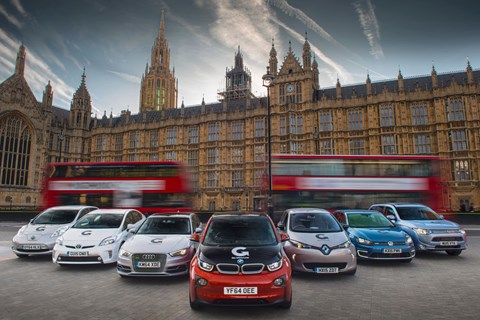► £5000 plug-in car grant extended
► Continues until ‘at least’ Feb 2016
► Plug-in cars under 75g/km eligible
Extension cables all round: the government has this week announced the Plug-in Car Grant, which offers £5000 off the price of cars that qualify as ‘ultra-low emission vehicles’ (ULEVs), will continue until at least February 2016.
Originally the plan was for the grant’s criteria to be reviewed once 50,000 electric vehicles had been registered in the UK, a milestone that is expected to be reached in November 2015.
Which cars qualify for the grant?
Currently, plug-in vehicles with CO2 emissions of 75g/km or below. As well as pure battery electric vehicles, hybrids with plug-in charging capability, such as the Volvo V60 PHEV for example, are also eligible for the grant.
What happens after February 2016?
It’s certain to continue in some form, with a tiered system in place based upon cars’ CO2 output mooted. An announcement on the grant’s longer-term future will be announced following a spending review in November 2015. The Government has recently announced that £200 million has been made available to continue the grant.
Is the grant really getting more people into electric (or at least part-electric) vehicles?
A complex question, but registrations of ultra-low emission vehicles are on the up – not least because more such vehicles are arriving in showrooms. According to Go Ultra Low, a Government-backed campaign to encourage more private car buyers and company car fleets to consider ULEVs, registrations of plug-in cars in the first six months of 2015 grew by 256% against the same period last year, and have already exceeded the full-year total of 2014.

Transport minister Andrew Jones this week described the UK as the fastest growing market for electric vehicles in Europe.
Reaction to the grant extension
‘With British buyers taking to ultra-low emission vehicles faster than anyone else in Europe, the extension of the Plug-in Car Grant is good news,’ said The Society Motor Manufacturers and Traders’ chief exec Mike Hawes. ‘The market for these vehicles remains small, however, so it is essential that government continues to provide effective incentives for their uptake – including the Plug-in Car Grant and other measures.’
Mitsubishi is a company that has done particularly well out of the grant, its petrol-electric hybrid Outlander PHEV becoming the best-selling plug-in car in the UK by some margin. Perhaps unsurprisingly, it suggests it is too early for the government to reduce or amend buyer incentives. Managing director of Mitsubishi Motors UK Lance Bradley said: ‘We have seen ultra-low emission vehicles rapidly establish a 1% share of UK sales in a period of time unprecedented in automotive terms. We welcome the Government’s decision to continue these incentives in a way which recognises the fledgling nature of this low emissions market. Car manufacturers invest in new technologies on the basis of three- to five-year horizons for market introduction.’